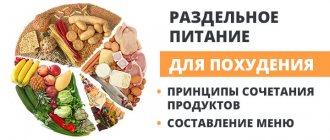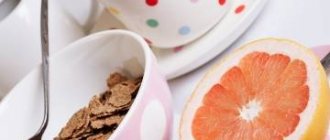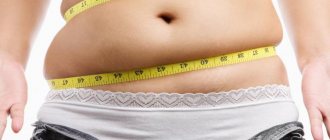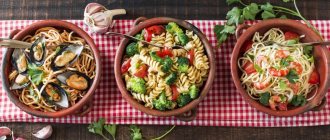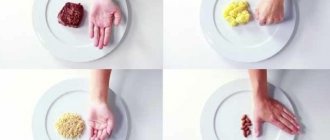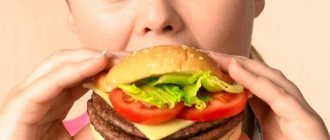Proper nutrition for constipation can eliminate it in most cases. At the same time, weight loss usually occurs - even in situations where it was difficult before. But it’s not always just a matter of nutrition—sometimes eliminating psychological causes also helps to cope with constipation. Where to start and how to cure constipation if this problem is yours?
A pathological condition when bowel movements are delayed. A condition that impairs the quality of life and sometimes lasts for years. Constipation disrupts digestion and makes weight loss difficult. It is simply impossible to lose weight if a person suffers from constipation.
Normally, the intestines empty their bowels 1–2 times a day or once every two days. Both options are normal, of course, if there are no other symptoms or discomfort. The science of biorhythms says that the most active time of peristalsis of the large intestine is from 7 to 9 in the morning, so most often the act of defecation occurs at this time for most people.
There are three types of constipation:
- Nutritional – due to poor nutrition, unbalanced diet. In this case, diet therapy will help get rid of constipation. It is this variant of constipation that develops in children, even infants.
- Dyskinetic - due to poor movement of the food bolus through the intestines, due to a violation of its motor function. This happens due to the presence of abnormalities in the structure of the intestines, with some endocrine diseases, while taking medications, and mental illness.
- Mechanical constipation is associated with obstacles in the movement of feces through the intestines. This option is observed in tumors, adhesive intestinal disease, and hemorrhoidal disease.
Each of these types of constipation can and should be corrected with nutrition. Let's look at the causes of constipation and find a solution.
Reason one: not enough water
The main cause of constipation today is simply a lack of fluid. People do not drink clean water, but drink tea, coffee, and sweet drinks. For the same reason, there is no feeling of thirst.
Drink water 5 minutes before meals - this process properly regulates digestion. Japanese nutritionists recommend drinking 500–600 ml of water in the morning, after getting up. This amount is enough to trigger peristalsis (contraction) of the intestine, rinse the mucous membrane, clearing the villi, and trigger the urge to defecate.
Drink your daily amount of water, evenly distributed throughout the day. During the treatment of constipation, you can increase it by 300–500 ml.
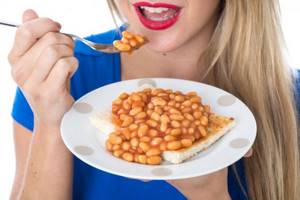
What to do?
If you experience constipation while on a diet, it is important to understand what to do in such a situation. First of all, review your diet. The menu should include fresh vegetables and fruits rich in fiber. In the absence of flatulence, you can include legumes and whole grain bread in your diet. Plums, dried apricots, beets, prunes, and vegetable oils have a laxative effect.
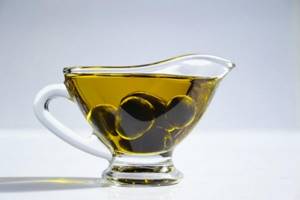
Basic recommendations for preventing constipation:
- Drink at least 1.5 liters of clean water per day. Drinking enough fluid will help you achieve soft stool consistency and regular bowel cleansing. Half an hour before meals, drink a glass of warm water.
- Refusal of protein diets and mono-diets. The menu of such diets is unbalanced. Fiber must be present in the diet! It plays a big role in the functioning of the gastrointestinal tract and maintaining the normal balance of microflora.
- Physical activity. Difficulties in defecation after a diet can also occur if, due to a poor diet, there is no strength left for physical activity. Moderate and regular exercise will help improve metabolic processes and blood circulation, and normalize intestinal motility. Pay attention to the work of the abdominal muscles. There is no need to overwork yourself in the gym - morning exercises and daily walks and visits to the pool are enough.
It is strictly not recommended to help the body say goodbye to kilograms by uncontrollably taking weight loss medications. Be sure to consult your doctor to avoid complications.
The doctor will give individual recommendations on how to avoid constipation while dieting. By contacting a nutritionist, you will receive recommendations on proper nutrition and prevent possible complications.
Reason two: low fiber
Many people note a worsening problem with constipation in winter. The reason is clear: in winter, the amount of vegetables and fruits in the diet, especially those rich in fiber, is sharply reduced. Lack of nutrition of the main element of the food bolus provokes constipation. The World Health Organization recommends consuming 7-8 servings of vegetables per day, regardless of season.
What foods to eat for constipation
- beet;
- prunes;
- White cabbage;
- Brussels sprouts;
- broccoli;
- tomatoes;
- pumpkin;
- celery;
- parsley;
- dill;
- figs;
- dried apricots;
- chia seeds;
- flax seeds;
- oat bran, wheat bran;
- oatmeal;
- wheat cereal;
- natural yogurt.
We will separately discuss bran - a product containing the hard shell of the grain. They come in barley, oat, wheat, rye, and so on. Bran contains a large amount of fiber, which forms the food bolus. The main indication for the use of this product is constipation, in this case it is recommended to take 20–30 g of bran per day. They work especially well raw.
The bran swells in the intestines, pushing out the contents. There is one important point: you need to wash down the bran with a glass of water and, in general, when consuming bran, be sure to follow the drinking regime.
There is a completely wrong opinion about the role of bran in weight loss. But bran itself does not contribute to fat burning in any way. They only help to cleanse the intestines in a timely manner and prevent constipation, which is undoubtedly important for losing weight.
I do not recommend consuming raw bran all the time: coarse fiber damages the intestinal villi and can lead to the development of an inflammatory process. This dietary supplement must be taken in a course. As a prevention of constipation and to cleanse the intestines - 2-3 weeks, no more. The course can be repeated after 2–3 months or as needed.
There are two types of bran: loose and pressed. Pressed ones are most convenient to take as a snack; in addition, they are more pleasant to eat, they resemble snacks. Loose bran can be added to salad, yogurt, yogurt, and ready-made porridge for breakfast. Choose bran without additives or flavorings and without sugar.
What foods should you avoid if you have constipation?
- rice;
- semolina;
- pears;
- blueberry;
- quince;
- persimmon;
- cheese;
- products made from yeast dough;
- White bread;
- coffee;
- strong tea;
- jelly;
- hot seasonings and spices;
- meat broths;
- mushrooms;
- jelly, marmalade, pastille;
- red fish and caviar.
Constipation during weight loss: what is dangerous and how to eliminate it
Many people who are overweight suffer from constipation. This is explained, in particular, by the fact that with improper nutrition, the intestinal microflora is disturbed. What are the dangers of constipation and how to eliminate them without using laxatives? Let's find out in this article.
I have repeatedly written in my articles about the main mistakes of those who want to lose weight. Sudden physical activity and a strict diet are the worst things you can think of. The body will begin to resist, because such sudden changes are stress. The situation is aggravated by the fact that you limit yourself in nutrition, the body does not receive enough nutrients and building material for the proper functioning of cells.
Low-carb diets are especially
, in which protein foods predominate in your diet, and carbohydrates are reduced to a minimum.
Excess protein leads to increased stress on the kidneys, liver and intestines, to the formation of kidney and gallstones, and to dysbiosis. Lack of fiber
causes constipation.
Main causes of constipation:
-Lack of water in the diet -Lack of fiber in the diet -Irregular eating -Lack of physical activity
What are the dangers of irregular bowel movements?
- Chronic fatigue - Vitamin deficiency (due to poor absorption of nutrients) - Neuroses, stress, emotional disorders - Pain and bloating - Allergies - Hemorrhoids - Impaired motor function of the intestines and the entire gastrointestinal tract - Dysfunction of the gastrointestinal tract - Intoxication of the body - Polyps and neoplasms in intestines
With constipation, food is poorly digested, even with a seemingly healthy diet. The processes of rotting and fermentation occur in the intestines, the microflora is disrupted: pathogenic bacteria and microorganisms grow. This has a negative impact on the functioning of the entire body. In this state of affairs, it is very difficult to get rid of excess weight.
How to deal with constipation?
First of all, it is important to regulate your diet. Add more vegetables, herbs, and fruits
.
This is fiber that will gently cleanse the intestines, removing undigested food particles, toxins and other waste from it. In addition, most vegetables and fruits are negative calorie foods
, which means that when you eat them, you will lose weight!
If it is difficult for the body to digest raw vegetables and fruits, prepare vegetables by stewing, boiling, baking
.
But do not forget that heat treatment destroys vitamins and enzymes
. Therefore, still try to eat raw vegetables and fruits that are comfortable for your digestion.
Reduce your intake of fats, especially animal fats
.
Add vegetable fats
containing polyunsaturated fatty acids to your diet.
Eliminate refined white flour
, which cause active mucus formation in the intestines, “glue” the intestinal microvilli, blocking the absorption of food.
Be sure to drink enough water
, at least 1.5 liters per day. When there is a lack of water, the body becomes dehydrated and this affects the functioning of the intestines.
Eat fermented foods
to replenish the balance of beneficial bacteria in the intestines: kefir, yoghurts (only natural, preferably homemade), sauerkraut, pickled beets.
fasting days once a week
on vegetables, fruits, cereals. Thanks to fasting days with such products (containing a large amount of fiber), the intestines will be actively cleansed, and the stool will gradually improve.
This diet will replace your laxatives.
, by the way, which are far from harmless to the body.
I offer you my other articles on the topic of colon cleansing and weight loss:
Did you find this article helpful?
Then I ask you to support my channel with a like and share this article with your friends on social networks . Buttons on the side. Thank you!
With you was Inna Zorina, dietician-nutritionist, weight correction coach, healthy nutrition specialist. Add me as a friend on my VKontakte page!
Source
Reason three: low fat
The fashion for “low-fat” diets and foods has exposed many problems: high cholesterol, sugar addiction and... constipation. The role of fats in the development of constipation is great. The sphincter of the gallbladder, which releases bile to process the food bolus and further transport it to the underlying sections of the intestine, opens only under the influence of fatty foods. If there is no fat in the diet, then the entire digestion process is inhibited.
As a result, constipation in the upper parts of the gastrointestinal tract, constipation in the lower parts... Therefore, be sure to add oils to prepared foods, include fattier varieties of meat and fish, not only lean ones, use butter no more than 5-10 g per day.
Prohibited Products
First of all, the intake of food that causes flatulence, fermentation and putrefactive processes in the intestines is limited. In addition, it should not irritate the stomach. For spastic constipation, it is served in the form of a puree. It is recommended to avoid eating viscous cereals and foods containing a lot of starch and tannin, due to their slow movement in the intestines. Avoid foods that “overstrain” the gallbladder, as they overload the digestive tract and impair intestinal motor function.
Avoid eating rice and pasta, which cause a fixing effect.
List of prohibited products:
- bananas;
- mushrooms;
- mayonnaise;
- alcohol;
- meat and fish of fatty varieties;
- garlic, radishes, turnips, onions;
- fried egg;
- legumes (limited);
- flour dishes (especially fried pies, dumplings, dumplings);
- pastries from butter dough;
- blueberries, quince, dogwood;
- rice (in excess);
- smoked dishes, canned food;
- strong tea, coffee;
- chocolate, cream dishes;
- pepper, horseradish, mustard;
- jelly;
- jelly, marmalade, pastille;
- slimy porridge.
If for some reason it happened that prohibited products were consumed, measures must be taken to neutralize their fastening effect. You can use laxatives, do an enema, or include foods recommended for constipation in your diet. If you leave everything to chance, all efforts to eliminate the problem, which have been achieved for months, will come to naught.
Reason four: you are on a diet
In pursuit of quick weight loss results, many rush to extremes and, starting from adolescence, try different diets. Very often they are accompanied by constipation. They usually occur:
- on protein diets. A lot of protein in the diet, a minimum of fats and carbohydrates and very little fiber are factors in the development of constipation even in the healthiest intestines.
- with severe nutritional deficiency. Low-calorie or mono-diets contribute to the development of acute constipation due to insufficient volume of food bolus.
There is only one conclusion: don’t lose weight on diets. This is incompatible with the normal physiology of the body, is not long-lasting and contributes to the development of complications. Start with a healthy diet.
Advertising
The role of fiber
Dietary fiber is the basis of plant structure.
As needed by the body, this nutritional component can be supplied along with water, carbohydrates, proteins and fats. Fiber absorbs and removes harmful substances from the gastrointestinal tract. The benefit of dietary fiber is the adsorption of water. As a rule, with constipation, stool that has a hard consistency stagnates in the human body. Dietary fiber, absorbing water, becomes jelly-like, envelops and softens the solid fractions of waste food. In addition, fiber helps increase the volume of feces, the number of beneficial bacteria in the intestines, enhances the enzymatic activity of microorganisms, and facilitates bowel movements.
Reason five: rare meals
Due to the general lack of time, many people eat only twice a day: morning and evening. Thus, the body does not receive nutrients for most of the day, and severe physical hunger accumulates. Upon arrival from work, in the evening, the main meal takes place, which in volume and composition largely exceeds a normal dinner. In the evening, the activity of the digestive system decreases sharply, and enzymatic activity also decreases. Poorly digested large amounts of food are very difficult to pass through the intestines at night. And in the morning there is no bowel movement.
For comfortable digestion, you need a diet - meals once every 3-4 hours. And in the evening you definitely need to have dinner, but dinner should be easily digestible, no more than 400–500 g in finished form. Then the next morning your stool will be like clockwork.
Olga, 36 years old, came with the problem of excess weight and constipation. There was no stool for 7-8 days. At first I had terrible pain in my stomach, but then I got used to it. Local therapists shrug their shoulders and don’t give recommendations on diet, only taking laxatives. The problem has been bothering me for 3-4 years now.
After the consultation, the reasons were clear: coffee 4 times a day, practically no vegetables in the diet, rare meals - 2 times a day and no water at all, I haven’t played sports for 10 years.
We immediately started a laxative diet, added vegetables for breakfast, lunch and dinner and 2.5 liters of water. At first there was stool once every 4 days, after a month - once every 2 days, productive weight loss was underway. After connecting to yoga, the bowel movements became regular - once a day or once every two days. At the same time, the state of health and digestive comfort were fully consistent with the norm.
Folk remedies
The fastest and easiest way to combat constipation is to use laxatives that stimulate intestinal motility through chemical action.
These include: Gutalax, Fortrans, Bisacodyl, glycerin suppositories, Duphalac, Normaze, Lactusan. However, when abused, they disrupt the electrolyte balance, reduce the sensitivity of receptors, and cause addiction to the body. Folk remedies, on the contrary, contain substances that help soften stool - vegetable oil, petroleum jelly.
Methods to combat constipation:
- Warm water on an empty stomach (300 milliliters) to start the digestion process.
- Fresh kefir before bed.
- Raw fruits and vegetables: cabbage, beets, plums.
- Abdominal massage.
- Red rowan fruit syrup infused with alcohol. To prepare a medicinal drink, the berries are covered with sugar in a ratio of 1: 1 or 1: 2 and left for a month. Then the syrup is separated from the cake, alcohol is added at the rate of 25 milliliters of ethyl per 500 milliliters of rowan juice. Take 25-50 milliliters in the morning before meals.
- Burdock root infusion. Pour 5 grams of raw material with 200 milliliters of hot water, leave for 3 hours, take 100 milliliters 3 times a day before meals.
- Medicinal mixture for constipation. Combine 7 grams of senna leaves, anise fruits, joster, licorice root, buckthorn bark, pour boiling water, leave for 2 hours. Take 100 milliliters 30 minutes before meals.
- A decoction of raisins or flax seeds.
- Freshly squeezed grape juice. Before breakfast, lunch and dinner, drink 150 milliliters.
- Sauerkraut. To normalize intestinal function, include 150 grams of the product in your daily diet. Sauerkraut contains organic vitamin C, lactic acid bacteria, dietary fiber, and potassium, which fight intestinal problems, eliminate the manifestations of dysbiosis, and restore the motor function of the organ.
- Prune decoction. Pour berries (500 grams) into boiling water (3 liters), and cook the laxative drink for half an hour. Then remove from heat, cool, add 50 grams of pureed buckthorn bark, and boil for 20 minutes. After this, 200 grams of rose hip extract are added to the cooled broth.
Directions for use: regularly before bed, take 150 milliliters of the product until complete recovery.
A decoction of prunes makes stool regular, normalizes the functioning of the digestive system, and is useful for dysbacteriosis, hemorrhoids, and colitis.
To eliminate constipation in a child under 2 years old, the baby is given dill water (5 milliliters), Duphalac and glycerin suppositories are also allowed. Method of preparation: pour 5 grams of seed with 200 milliliters of boiling water, leave for 40 minutes, strain. To normalize intestinal motor function, children over 2 years old can be given mint infusion, aloe juice and mixed 5 grams of bran (wheat, oat) into the porridge. Constipation in a child may be associated with a sudden transition from one type of formula to another. Children over 7 years old are allowed to give the same laxatives as adults.
Reason eight: lack of sports and activity
Constipation may be caused by insufficient blood supply to the pelvic organs. A sedentary lifestyle and minimal movement lead to congestion in the pelvis, starting with diseases of the female genital organs and ending with constipation.
Add physical activity to your life. You can start with walking and swimming, while adding strength and functional training. Kegel exercises are excellent for constipation - this is the health of all pelvic organs. Find a workout that you feel comfortable doing every day.
Polina, 54 years old, arrived at a comfortable weight, but with the only complaint - constipation due to hemorrhoids. Constipation began with the onset of menopause.
After analyzing the situation, several problems were identified: there were only two meals, in small portions, there were no fats in the diet at all, and there was no sports, although anyone who is 54 years old has it - this is very rare.
Since there were no problems with weight loss, we simply balanced the diet, added fiber in the form of vegetables and fruits; before this, the patient had not eaten fruits at all. They added fats, even prescribed additional omega acids and vitamin D for 3 months. Sports were introduced in the form of functional training with a personal trainer. The stool returned to normal within the first 10 days.
Advertising
Basic principles of diet therapy for constipation
The basic principles of proper nutrition for constipation are normalizing the diet and following a special diet. The proper functioning of the intestines and its ability to have regular bowel movements largely depend on the regime and diet. Therefore, diet therapy should become a mandatory component of treatment. In many cases, proper nutrition for intestinal constipation is enough to normalize stool.
How to eat with constipation to get rid of the problem? Nutrition for constipation should be complete and varied. The daily intake of basic nutrients should be 400-450 g of carbohydrates, 60-100 g of protein and 40-80 g of fat. In addition, you need to ensure that your diet contains minerals, vitamins, macro- and microelements.
What food should you eat for constipation of any etiology? The diet of a person suffering from this disease should contain a lot of plant fiber (ballast substances that stimulate digestion in general and intestinal motility in particular). Plant fiber causes a quick feeling of fullness, suppresses appetite for a long time and at the same time contains few calories. Plant fibers increase the mass of intestinal contents and dilute it, thereby accelerating the exit of feces from the intestines.
What is best to eat and drink for constipation: laxative food
So what should you eat and drink if you are constipated to help you have a bowel movement? Products that normalize the evacuation function of the colon include:
- dried fruits and fresh fruits, except astringents;
- vegetables in any form (boiled, stewed, raw). Some vegetables (for example, green peas) are not recommended to be consumed raw, although after heat treatment they may even be useful;
- vegetable and fruit juices with pulp (except apple and grape);
- marmalade, marshmallows, fruit pastilles, natural honey;
- dairy products;
- sea kale.
First courses should be cooked in low-fat meat or fish broth. It is optimal to cook them in vegetable broths, adding separately cooked chopped lean meat at the end of cooking.
Meat dishes are prepared from lean meat by baking, stewing or boiling. It is better to steam fish. It is better to exclude salted fish from the diet.
When preparing dishes, preference should be given to vegetable oils (olive, sunflower, corn, flaxseed, pumpkin), you can also use butter.
Every day you need to eat a chicken egg, boiled soft-boiled or cooked in the form of an omelet (instead of whole milk, a little kefir is added to the omelet).
Cottage cheese, sour cream and hard cheeses on your table should be fresh, non-acidic and not too fatty. It is better to prepare casseroles, puddings, and baked goods from these products (cheesecakes or cheese cookies with cauliflower). It is better to choose mild varieties of cheeses, without spices and flavors. The more spices and flavors in cheese, the higher the likelihood that it will have a negative impact on the digestive system.
Tea must be drunk with milk or cream. Coffee should be weak and with milk. You should drink a lot of water (spring or mineral). In the morning on an empty stomach, you must drink 1 glass of water and only 20-30 minutes after that start breakfast. You can also prepare decoctions and compotes from rose hips, prunes, dried apples and other dried fruits. As for alcoholic beverages, it is permissible to consume white grape wines.
What foods cause constipation?
There are a number of foods that can cause constipation even in absolutely healthy people. You should avoid them completely or significantly limit their presence in your diet.
The following are foods that you should never eat if you have constipation:
- canned meat and fish. Canned vegetables do not affect intestinal function, so they can be consumed in any reasonable quantity;
- refined drinks and foods;
- white bread, pastries, cakes, pastries, butter cookies with cream;
- protein products, if they predominate in the diet. If a person eats mainly dairy, meat and fish products, he develops constipation;
- vegetables and fruits with astringent or fermentation-promoting properties (blueberries, lingonberries, pears, quince, dogwood, garlic, mushrooms, radishes, onions, sorrel);
- animal fats (lamb fat, lard);
- pasta;
- strong meat broths;
- natural coffee, strong black or green tea, jelly, cocoa;
- candies and chocolate;
- natural red wines;
- apple and grape juices, which provoke increased gas formation and, as a result, the creation of air plugs in the intestines that interfere with the release of feces;
- ready-made sauces (mayonnaise, ketchup, etc.).
Diet and drinking regimen for constipation: what is best to eat and drink
Now that you know what kind of food for constipation is recommended by doctors, pay attention to the correct diet. It is better to plan the menu in advance, a day in advance: this way you can control not only your diet, but also your budget. You should eat meals in small portions, 5 times a day (breakfast, lunch, dinner, two snacks).
Breakfast should never be skipped, as it “sets the tone” for the work of the digestive tract for the whole day. Moreover, you need to have breakfast not “on the run,” but in a calm atmosphere and without unnecessary haste. It is better to develop the habit of getting up 15-20 minutes earlier in the morning in order to have time to have breakfast calmly.
Porridge and other grain dishes should be eaten for breakfast, since it will take the body a lot of time to digest them normally. Porridge for dinner is a bad idea; it will hinder digestion and cause morning bowel problems. For lunch, it is very advisable to eat the first course - soup, borscht, cabbage soup. Dinner should be light and not burdensome for the digestive system. At night before going to bed, it is better to drink 1 glass of low-fat kefir.
Unfortunately, not everyone has the opportunity to eat regularly and nutritiously: work, study or other worries prevent them from eating on time.
However, you should try to normalize your diet for constipation in any case; you should not skip meals, snack “on the run,” or gorge yourself at night after a whole day of fasting. If you live in exactly this mode, it means that constipation is caused precisely by improper and irregular nutrition.
Not only the diet is important, but also the drinking regimen for constipation: a healthy person should drink at least 2.5 liters of liquid per day. This amount includes both plain water and soups, teas, coffee, and juices. You need to drink at least 1-1.5 liters of boiled water per day.
Older people should drink slightly less so as not to overload the kidneys and cardiovascular system with excess fluid. It is better not to drink water at night, so as not to provoke the appearance of edema.
